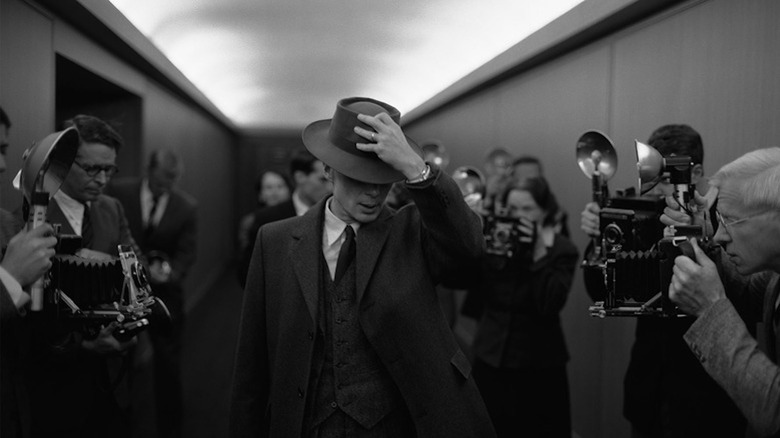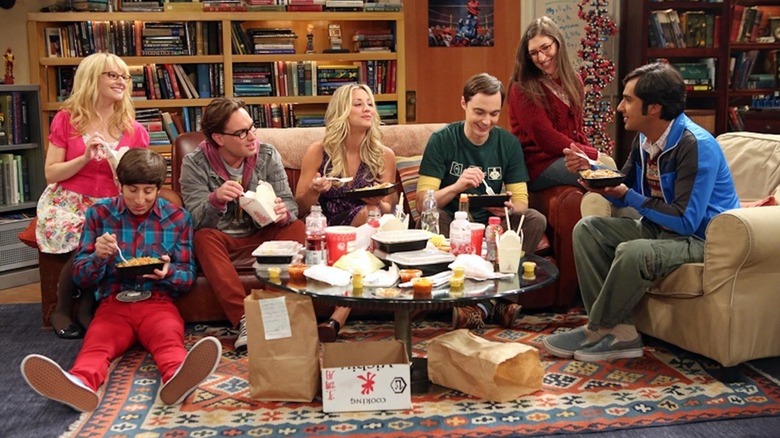Oppenheimer And The Big Bang Theory Share A Small But Significant Connection
Christopher Nolan is a very smart man who makes very smart movies (and "The Dark Knight Rises"), so it's fitting that he would be drawn to J. Robert Oppenheimer, the theoretical physicist who led the Manhattan Project and created the most awesomely destructive weapon in human history. It's also not surprising that a man who's never made a bad movie (save for "The Dark Knight Rises) aced his biopic assignment with "Oppenheimer," which is currently torching the global box office and looking an awful lot like this year's Best Picture frontrunner.
Part of what makes Nolan one of the finest filmmakers of his generation is his respect for expertise. When, for instance, he makes a movie about astronauts traveling through a wormhole, he collaborates with the man who wrote the literal, and thus-far definitive, book on the subject (theoretical physicist Kip Thorne). And when the payoff is a brainy masterpiece like "Interstellar," which is looking more and more like the most devastatingly prophetic film of the 21st century, you lament that most of his peers aren't trying to emulate his scrupulousness.
And if, for some baffling reason, you're looking for the equivalent of a Nolan film amid the network sitcom landscape, you might just find it in CBS' long-running "The Big Bang Theory."
Though the Chuck Lorre-co-created series was initially lambasted as a fake-nerd facsimile of Edgar Wright, Simon Pegg, and Jessica Hynes' Brit-com "Spaced," it did eventually find favor amongst actual rocket scientists. And this is because, in between the relentlessly formulaic sitcom writing, the show sought the input of the same experts Nolan has consulted throughout his career.
Bringing big brains to The Big Bang Theory
In an interview with Bulletin of the Atomic Scientists (a publication founded by Albert Einstein, and not one commonly cited on /Film), Nolan name-dropped two of the most respected physicists on the planet as integral advisers to the hard-science aspects of "Oppenheimer": his old "Interstellar" buddy Thorne and UCLA's David Saltzberg. Actually, Thorne proved useful as an acting coach of sorts to Cillian Murphy. As Nolan told the Bulletin:
"Kip attended Princeton, among other institutions, and while at Princeton went to seminars at the [Institute for Advanced Studies] under Oppenheimer and actually met him; he actually watched him teach. And so I was able to put Kip on the phone with Cillian — and then he visited the set — to talk about what it was like to watch Oppenheimer manage a group of minds in a seminar, how he would organize a debate, how he would apparently listen to all these different points of view and summarize them very, very efficiently and eloquently, and move the dialogue forward."
As it turns out, Thorne did more than visit the set of "The Big Bang Theory." He cameoed as himself in an episode during its final season. As for Saltzberg, he was key to keeping Lorre's series scientifically accurate wherever possible, which included drawing up complex formulae on whiteboards in the backgrounds of shots.
So whatever you think of "The Big Bang Theory," know that, when it came to the smart stuff, it was every bit as committed to accuracy as Christopher Nolan. And its egghead characters were probably just as disappointed by "The Dark Knight Rises" as you were (perhaps this was covered in the show; I would have to watch it to know).

